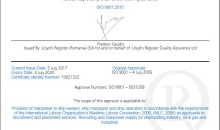The maritime sector is one of the most demanding and complex of all economical sectors. It is the major worldwide “engine” linking all industries. The modern maritime transportation is the key factor of economic development of each country, providing shipping services and the manpower to manage the fleet of ships and all related services.
The two vital players to keep the business rolling are the ships and the human resources. For both of them the maritime industry requires qualified personnel, either professionals for ships building or crews’ officers and ratings for ship navigation.
The young high school graduates face a wide range of possibilities when thinking of the next educational choice in order to obtain not only a diploma but also high qualifications necessary for a career in the maritime business.
Each year thousands of Romanian graduates are looking for higher educational institutions that will provide them the specific training either for the technical crafts or for navigation ranks. Marine craftspeople work in the shipbuilding, ship repair and conversion, and the boat building, repair and restoration sectors. The work can range from building hulls and super-structures on sea-going vessels to installing the fixtures and fittings on a small boat. Depending on the job, various craft skills are used – carpentry, electrical, plumbing, welding and painting, as well as traditional maritime crafts: Design engineers, Dock masters, Project managers, Dock engineers, Dock motormen, Dock electricians, Steel work foremen and charge hands, Rigger foremen, Pipe foremen, Mechanical foremen, Hull treatment foremen, Scaffolder foremen, Yard electricians for electrical maintenance and new electrical equipment, Coded welders for electric arc, argon and CO2 welding.
The above mentioned that are involved in shipbuilding deal with the construction of all types of ships up to larger ships, tankers, and oil and gas platforms for offshore sites. Ship repair workers are normally based at a dockyard working on all sizes and types of vessel.
The people that consider they want to embrace one of the mentioned professions must follow one of the specializations provided by the country’s educational institutions. Depending on the craft or profession there are certain educational training required, from attending 8 to 12 grades in a state institution followed by other courses specific to the craft chosen, the future professionals get a diploma and start working in their trade field. They can promote on the professional hierarchy by gaining experience. If they attend the higher education they can accede the top jobs in their trade.
The persons who want to sail the seas and oceans of the world, must consider that the compulsory education include graduating a maritime higher institution in order to access a career in navigation. They can choose to study in a university either to become officers for the Romanian Naval Forces, or maritime officers and engineers for the merchant marine navy. There are many specializations that can offer training for all type of activities related to maritime sector and here are some examples: Navigation, Naval Architecture and Marine Engineering, Naval Systems and Technologies, Mechanical, Industrial and Maritime Engineering, Shipping and Port Management, Telecommunication Systems, Environmental Engineering, Naval Transport, Business and Engineering in Transports etc.
There are institutions that are exclusively dedicated to the maritime education. The main characteristics of these institutions are given by the existence of an international standard imposed by the International Maritime Organization (IMO) that is compulsory for all maritime universities combined with the national engineering curricula, that is also compulsory in accordance with the national standards.
Every year these institutions, which are seen, both locally and internationally, as a source of highly qualified labour force in the maritime field, have a growing number of students willing to undergo the educational process for this is the first and major step to enter a maritime career. All these Romanian students are looking forward to sail the sea but in order to obtain their endorsement, they need an embarkation practice period. Deck Cadets require a minimum of 12 months sea period of which 6 months on watch and Engine Cadets currently a minimum of 6 months of which 3 months on watch. During this sea time they have the chance to put knowledge into practice and enjoy the best learning conditions on board and the opportunity to have access to the latest technology and equipment, essential tools for navigation activities.
Nedcon Maritime as the largest independent Romanian manpower supply company for clients all over the world is offering numerous possibilities for those willing to get a well paid job in international locations for major maritime players. In order to offer the most efficient and high quality services to our present and potential clients, the Nedcon Maritime team is proud to say that it represents the reliable partner in matching the best candidates with the required jobs. We are familiar with the Romanian maritime educational system and all Romanian Officers and shipyard specialists that we have recruited bring their contribution to our excellent reputation on the international maritime business market.









Leave a Comment